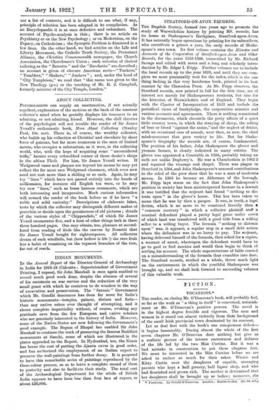ABOUT COLLECTING.
PSYCHOLOGISTS can supply an unattractive, if not actually repellent, explanation of the motives at the back of the amateur collector's mind when he genially displays his treasures to an admiring, or not admiring, friend. However, the chill theories of the psychologist will not trouble the reader of Sir James Yoxall's enthusiastic book, More About Collecting (Stanley Paul, 15s. net). There is, of course, the wealthy collector, who builds up his collection at Christies' and elsewhere by sheer force of guineas, but far more numerous is the man of limited means, who occupies a substratum, as it were, in the collecting world, who, with the hope of acquiring• some " unconsidered trifle," haunts every cobwebbed corner of those dealer's shops in the ultima Thule. For him, Sir James Yoxall writes. If Wedgwood vases and plaques are beyond his means he may yet collect the far more rare Wedgwood chessmen, which even now need not cost more than a shilling or so each. Again, he may try " lines " which. have not. paased entirely into the hands of millionaires, for instance old English tea ware, or he may try new " lines," such as brass harness ornaments, which are both interesting and inexpensive. Much curious information will, reward the reader of the book before us if he have " a noble and solid curiosity." Descriptions of elaborate fakes, tests by which the collector may distinguish different makes of porcelain or decide upon the genuineness of old pictures ; details of the various styles of " Chippendale," of which Sir James Yoxall enumerates five, and a host of other things lurk in these three hundred pages. One may obtain,, too, pleasure at second- hand from reading of finds like the canvas by Rossetti that Sir James Yoxall bought for cighteenpence. All collectors dream of such windfalls, but (how hollow is. life !), the rare fruit has a habit of remaining on the topmost branches- of the tree, far out of. reach.


































 Previous page
Previous page